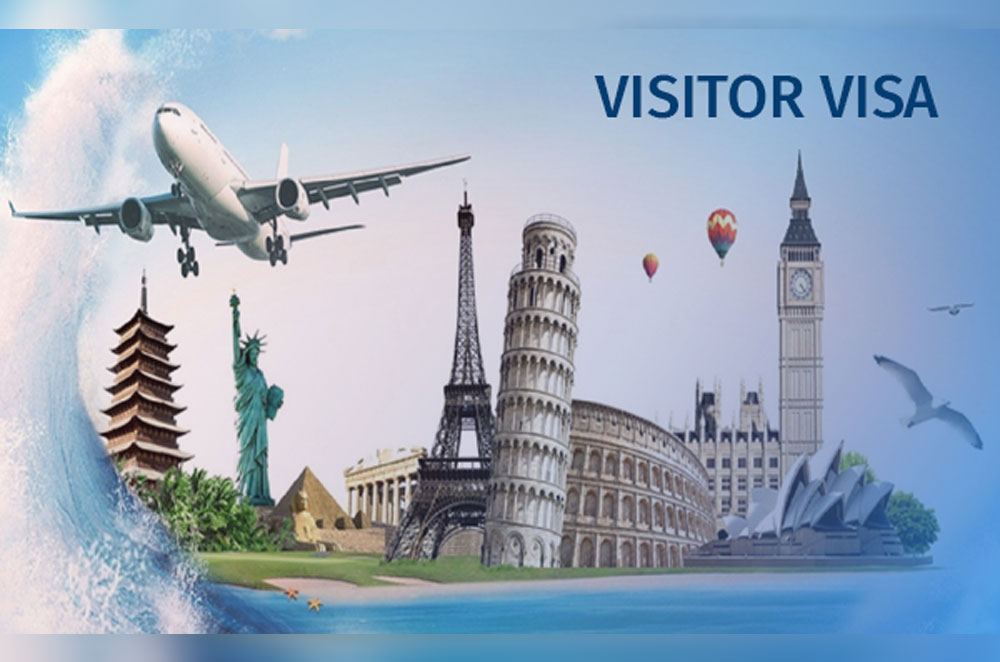Visitor Visa

A visitor visa is quite similar to a tourist visa, allowing travellers to enter another country for leisure purposes. While traveling abroad can sometimes be overwhelming, this article aims to clear up much of that confusion. As a temporary visitor, you can engage in short-term business activities, visit friends or family, or simply explore as a tourist.
Additionally, a visitor visa permits you to seek medical treatment overseas. It's worth noting that tourist visas are often issued upon arrival at airports or other entry points, while visitor visas typically need to be applied for in advance through the embassy or consulate of the destination country in your home nation. These visas can be valid for extended periods, sometimes lasting up to six months or more, depending on the specific regulations of the country. In this article, we will cover the various types of visitor visas, eligibility criteria, associated costs, and the necessary documentation.

When you visit a foreign country, there are often rules that don't apply to you in the same way they do for locals. However, there are still plenty of things you can enjoy freely while exploring abroad. Here are some of those activities:
There are various types of visitor visas, each tailored to the purpose of travel to a specific country. Every country has its own set of eligibility requirements and application procedures. Visitor visas can be categorized by the reason for travel, such as tourism, visiting family or friends, business purposes, or transit. Furthermore, these visas can also differ based on the number of entries permitted, which can be a single entry, double entry, or multiple entry.
| Pros | Cons |
|---|---|
| It provides the opportunity to connect with family and friends in the host country during significant events or to enjoy quality time together. | Visitor visas are usually for a limited duration, generally permitting stays that range from a few weeks to several months. |
| It’s usually simpler to get than long-term visas, thanks to more straightforward application procedures. | Visitor visas, similar to tourist visas, typically do not allow for employment or studying in the country. |
| Certain visitor visas permit multiple entries, enabling you to come and go from the country during the visa's validity period. | You might be limited to activities that are not for profit, such as work, study, or business involvement. |
| Typically more affordable than long-term or immigrant visas. | Renewing a visitor visa can be challenging and usually needs a compelling justification. |
| It gives you the freedom to travel at your own pace, making it ideal for quick trips. | Visitor visa holders usually do not qualify for public healthcare, so they need to obtain private insurance. |
| In addition to spending time with family and friends, one may also take the opportunity to discover the various tourist attractions within the host country. | Exceeding the duration of a visitor visa may lead to penalties, deportation, or the denial of future visa applications. |
| Typically, it necessitates fundamental documentation such as a passport, evidence of financial resources, and occasionally a letter of invitation. | Stays are typically set and cannot be readily extended without the need to depart and reapply. |
| Ideal for short visits without the requirement for residency or extended stays. | The renewal process can often be complex and may be rejected without explicit justification. |
| It is beneficial for individuals who require frequent brief trips to a country. | Certain countries have extra entry requirements or may ask for specific documents in addition to the visa. |
The particular qualifying requirements that apply to you will change depending on the nation.
Applying for a visitor visa for business can vary by country, but there are some common requirements you’ll usually need to meet. Here’s a quick rundown of the typical documents you might need:
The visitor visa fee varies from country to country. For example
The processing time for visitor visa applications generally differs by country.
Australia - The average processing duration for a 6-month visitor visa application to Australia is approximately 2 to 4 weeks from the submission date.
Canada - The optimal processing time for a visitor visa application to Canada is up to 15 days from the date of application submission.
USA - The processing duration for a USA Visitor Visa typically ranges from 3 to 5 weeks. The time taken for visa application processing in the US is influenced by the specific visa type and the current workload.
United Kingdom - When applying for a UK Standard Visitor Visa, you can anticipate a decision within three weeks following your appointment at the visa application center.
New Zealand - The processing time for visitor visa applications in New Zealand varies based on workload. Most applications are processed within a three-month timeframe.
Opting for these countries for your future international trip can simplify and speed up the visa application process. Stay updated with the latest visa guidelines and processing times by visiting Staroverseasco.in before planning your journey.